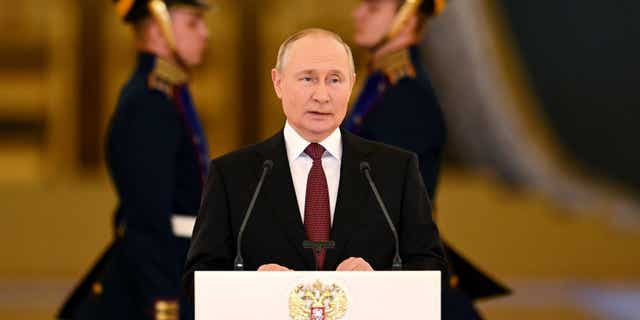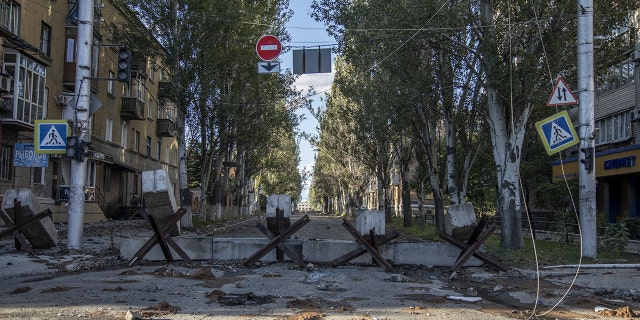Oct 5 (Reuters) – Russian TV journalist Marina Ovsyannikova, accused of spreading fake news after staging a series of lone protests against the war in Ukraine, said on Wednesday she had fled house arrest because she had no case to answer.
A woman who says to be the employee of Russia’s state TV Channel One, Marina Ovsyannikova, speaks in a statement recorded before holding up an anti-war sign live on air, in this still grab taken from a video uploaded March 14, 2022.
(Marina Ovsyannikova/via REUTERS.)
“I consider myself completely innocent, and since our state refuses to comply with its own laws, I refuse to comply with the measure of restraint imposed on me as of 30 September 2022 and release myself from it,” she said.
In a video posted on Telegram, she sat on a pink sofa and addressed Russia’s Federal Penitentiary Service, criticising President Vladimir Putin over the war.
“Put a tag like this on Putin,” she said, gesturing to what appeared to be an electronic ankle bracelet.
Her lawyer, Dmitry Zakhvatov, said she was supposed to turn up to a court hearing at 10:00 Moscow time (0700 GMT), but it was held in absentia as investigators had failed to establish her whereabouts.

Vladimir Putin delivers an address flanked by men in military uniforms. (AP)
(Pavel Bednyakov, Sputnik, Kremlin Pool Photo via AP)
He told Reuters the authorities do not know where she is and that she will be remanded in custody if caught.
Ovsyannikova grabbed world attention in March by walking out in front of studio cameras during an evening news broadcast on state television with a placard that read “Stop the war” and “They’re lying to you”.
RUSSIA CHAMPIONS ELON MUSK’S ‘PEACE’ PROPOSAL, UKRAINE REJECTS MUSK AS TWO-FACED
The Kremlin at the time denounced her act of protest as “hooliganism.”
The 44-year-old was given two months’ house arrest in August over a protest in July when she stood on a river embankment opposite the Kremlin and held up a poster calling Putin a murderer and his soldiers fascists.

Anti-tank hedgehogs block the streets in downtown Bakhmut as fighting between Ukrainian forces and Russian troops intensifies for control of the city in Bakhmut, Ukraine on October 04, 2022.
(Narciso Contreras/Anadolu Agency via Getty Images)
She faced a sentence of up to 10 years in prison if found guilty of the charge of spreading fake news about Russia’s armed forces.
Her house arrest was due to last until Oct. 9, but the state-run news outlet Russia Today reported on Saturday that she had fled along with her 11-year-old daughter, and that her whereabouts were unknown. How she left and where she went are still unclear.
PUTIN SIGNS LAWS ANNEXING 4 UKRAINIAN REGIONS OF DONETSK, LUHANSK, KHERSON AND ZAPORIZHZHIA
Russia passed new laws against discrediting or distributing “deliberately false information” about the armed forces on March 4, eight days after invading Ukraine.
 Milon Shil All About Entertainment, Lander World
Milon Shil All About Entertainment, Lander World